Chinese political system中国政治体制
中国政治制度史
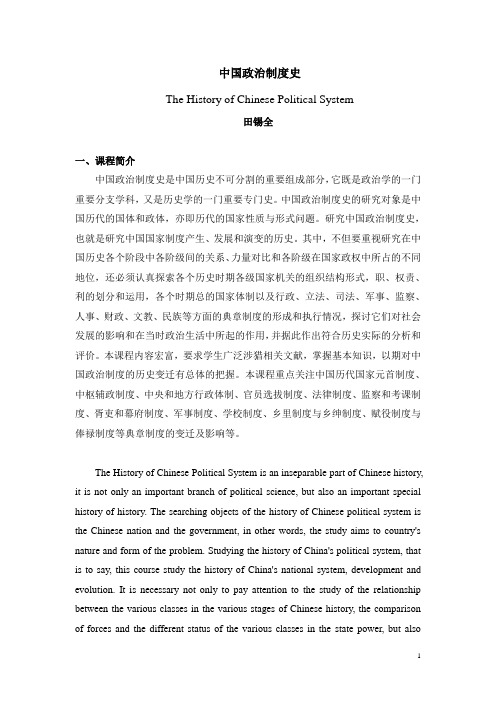
中国政治制度史The History of Chinese Political System田锡全一、课程简介中国政治制度史是中国历史不可分割的重要组成部分,它既是政治学的一门重要分支学科,又是历史学的一门重要专门史。
中国政治制度史的研究对象是中国历代的国体和政体,亦即历代的国家性质与形式问题。
研究中国政治制度史,也就是研究中国国家制度产生、发展和演变的历史。
其中,不但要重视研究在中国历史各个阶段中各阶级间的关系、力量对比和各阶级在国家政权中所占的不同地位,还必须认真探索各个历史时期各级国家机关的组织结构形式,职、权责、利的划分和运用,各个时期总的国家体制以及行政、立法、司法、军事、监察、人事、财政、文教、民族等方面的典章制度的形成和执行情况,探讨它们对社会发展的影响和在当时政治生活中所起的作用,并据此作出符合历史实际的分析和评价。
本课程内容宏富,要求学生广泛涉猎相关文献,掌握基本知识,以期对中国政治制度的历史变迁有总体的把握。
本课程重点关注中国历代国家元首制度、中枢辅政制度、中央和地方行政体制、官员选拔制度、法律制度、监察和考课制度、胥吏和幕府制度、军事制度、学校制度、乡里制度与乡绅制度、赋役制度与俸禄制度等典章制度的变迁及影响等。
The History of Chinese Political System is an inseparable part of Chinese history, it is not only an important branch of political science, but also an important special history of history. The searching objects of the history of Chinese political system is the Chinese nation and the government, in other words, the study aims to country's nature and form of the problem. Studying the history of China's political system, that is to say, this course study the history of China's national system, development and evolution. It is necessary not only to pay attention to the study of the relationship between the various classes in the various stages of Chinese history, the comparison of forces and the different status of the various classes in the state power, but alsoseriously explore the various historical periods at all levels of state organs of the organizational structure, the formation and implementation of the rules and regulations of the various national systems and administrative, legislative, judicial, military, supervisory, personnel, finance, culture and education, ethnic groups and other aspects of the formation and implementation of the system. This course systematically explores their social development and the role played in the political life at that time, and makes in line with the historical analysis and evaluation. The content of this course is abundant, so, it guides students to extensively cover the relevant literature, master the basic knowledge with a view to the historical changes in China's political system have overall grasp.This course focuses on the system of leader-selection of China, the central government system, the central and local administrative system, the officials’ selection system, the legal system, the supervi sion and examination system, the military system, the school system, Gentry system, tax system and the salary system and so on. It requires students to read relevant literature extensively, master the basic knowledge and grasp the historical changes in China's political system.二、教学目标在方法上,每讲都梳理各个历史阶段的制度变迁总体态势及其时代特色,中间穿插权威观点、补充背景内容,课后提供讨论和探究活动的建议和进一步阅读的文献。
当代中国政治制度 -第十一章
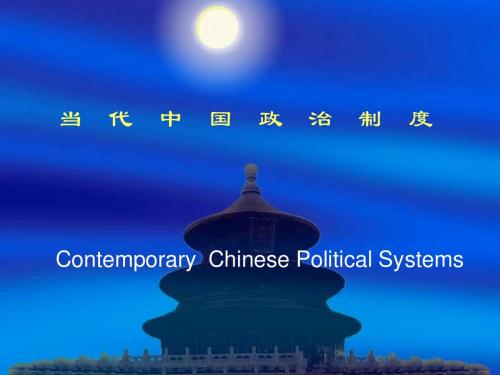
中
国
政
治 制
度
Contemporary Chinese Political Systems
第十一章当代中国特别行政区制度
通过本章的学习,理解建立特别行政区制度
的意义,认识香港特别行政区的政治体制, 了解特别行政区行政长官、行政机关、立法 机关、司法制度和公务员制度的职权与特点 。
第一节 特别行政区制度概述
(1)“三司”(即政务司、财政司、
律政司)是香港特别行政区政府的第一 级政府机构。 (2)“局”是香港特别行政区政府的 第二级政府机构。 (3)香港特别行政区除了设置“司” 、“局”之外,还设置“署”、“处” 等政府机构。
《澳门基本法》规定:澳门特别行政区政府
设司、局、厅、处,并设立廉政公署和审计 署独立工作。廉政专员和审计长对行政长官 负责。
二、特别行政区的法律地位
1.特别行政区是享有高度自治权的地方行政
区域
(1)特别行政区是单一制国家结构形式下的地方
行政区域。 (2)特别行政区是一个享有高度自治权,基本保 留原有法律,实行资本主义制度和生活方式的特别 行政区。 (3)特别行政区是直辖于中央人民政府的地方行 政区域,它享有高度自治权,不同于中华人民共和 国的一般地方行政区和民族自治区。
(2)坚持“两种制度”,即在统一的中华人
民共和国内,作为国家主体的大陆地区实行 社会主义制度,台湾、香港、澳门作为统一 国家不可分割的组成部分保持原有的资本主 义制度不变。 (3)高度自治。
[多选]特别行政区是地方的政权,除在外
交、国防等方面服从中央政府外,享有高度 的自治权,包括行政管理权、立法权、独立 司法权和终审权。
3、对行政长官提出弹劾案的职权。 香港特别行政区立法会全体议员的四分之一联合动
A0130003当代中国政治制度
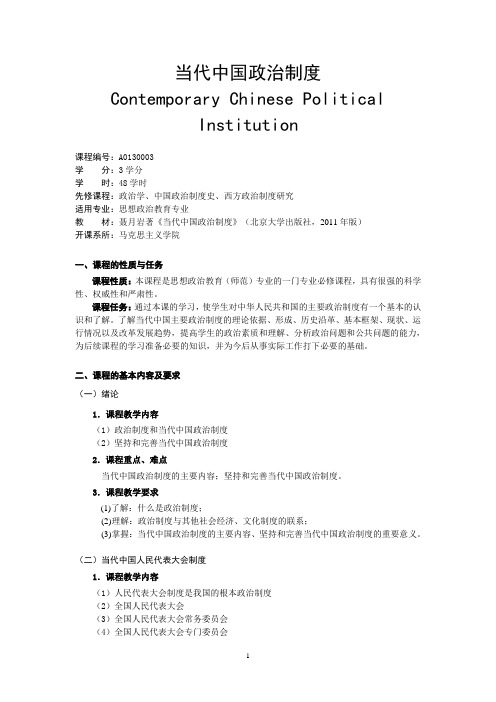
当代中国政治制度Contemporary Chinese PoliticalInstitution课程编号:A0130003学分:3学分学时:48学时先修课程:政治学、中国政治制度史、西方政治制度研究适用专业:思想政治教育专业教材:聂月岩著《当代中国政治制度》(北京大学出版社,2011年版)开课系所:马克思主义学院一、课程的性质与任务课程性质:本课程是思想政治教育(师范)专业的一门专业必修课程,具有很强的科学性、权威性和严肃性。
课程任务:通过本课的学习,使学生对中华人民共和国的主要政治制度有一个基本的认识和了解。
了解当代中国主要政治制度的理论依据、形成、历史沿革、基本框架、现状、运行情况以及改革发展趋势,提高学生的政治素质和理解、分析政治问题和公共问题的能力,为后续课程的学习准备必要的知识,并为今后从事实际工作打下必要的基础。
二、课程的基本内容及要求(一)绪论1.课程教学内容(1)政治制度和当代中国政治制度(2)坚持和完善当代中国政治制度2.课程重点、难点当代中国政治制度的主要内容;坚持和完善当代中国政治制度。
3.课程教学要求(1)了解:什么是政治制度;(2)理解:政治制度与其他社会经济、文化制度的联系;(3)掌握:当代中国政治制度的主要内容、坚持和完善当代中国政治制度的重要意义。
(二)当代中国人民代表大会制度1.课程教学内容(1)人民代表大会制度是我国的根本政治制度(2)全国人民代表大会(3)全国人民代表大会常务委员会(4)全国人民代表大会专门委员会(5)地方各级人民代表大会(6)县级以上地方各级人大常委会(7)乡级人民代表大会2.课程重点、难点人民代表大会制度的发展、性质与原则;全国人民代表大会;人民代表大会制度的改革与完善。
3.课程教学要求1、了解:人民代表大会制度是我国的根本政治制度、全国人民代表大会是我国的最高国家权力机关、地方各级人民代表大会是地方国家权力机关;2、理解:人民代表大会制度的发展、性质与原则、全国人民代表大会、全国人大常委会和各专门委员会、地方各级人民代表大会、人民代表大会制度的改革与完善;3、掌握:我国的政权组织形式、国家权力机关的设置。
中国政体-REVISED
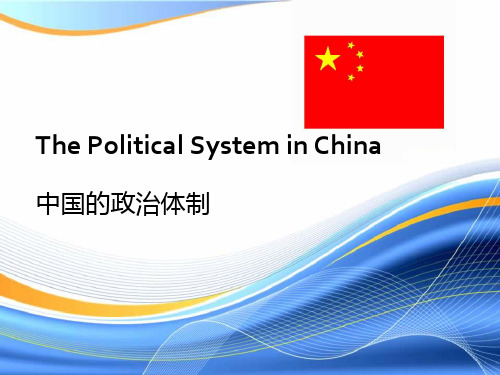
system of people's congress是人 大么,注意跟后 面的NPC保持一 致
The most powerful organ of state
• Accroding to Chinese Constitution, National People's Congress (NPC) is the most powerful organ of China. • NPC's permanent body is the Standing Committee of the NPC.
The compotision of NPC
• In accordance with the legal procedures, the menbers of NPC are all selected by democratic elections. • The deputies of NPC are elected by deputies in local people's congresses. And every deputy serves a term of five years.
The State Council
• The State Council is composed of premier, vice-premiers, state councilors, ministers, ministers in charge of commissions, auditor-general and secretary-general. • The premier has overall responsibility for the State Council.
中国政治制度史
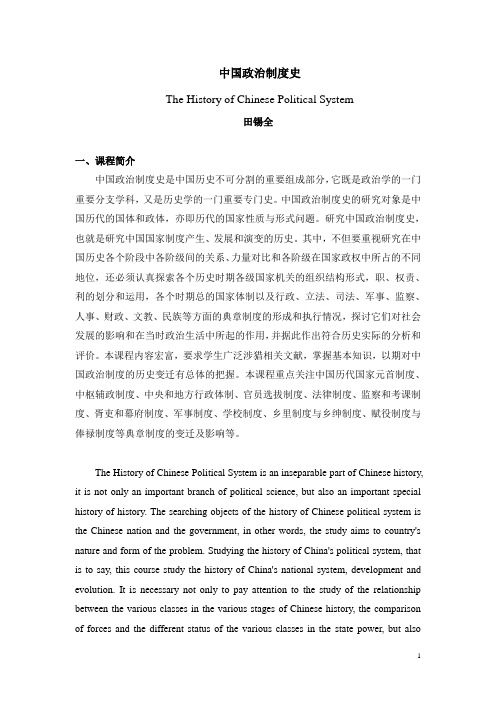
中国政治制度史The History of Chinese Political System田锡全一、课程简介中国政治制度史是中国历史不可分割的重要组成部分,它既是政治学的一门重要分支学科,又是历史学的一门重要专门史。
中国政治制度史的研究对象是中国历代的国体和政体,亦即历代的国家性质与形式问题。
研究中国政治制度史,也就是研究中国国家制度产生、发展和演变的历史。
其中,不但要重视研究在中国历史各个阶段中各阶级间的关系、力量对比和各阶级在国家政权中所占的不同地位,还必须认真探索各个历史时期各级国家机关的组织结构形式,职、权责、利的划分和运用,各个时期总的国家体制以及行政、立法、司法、军事、监察、人事、财政、文教、民族等方面的典章制度的形成和执行情况,探讨它们对社会发展的影响和在当时政治生活中所起的作用,并据此作出符合历史实际的分析和评价。
本课程内容宏富,要求学生广泛涉猎相关文献,掌握基本知识,以期对中国政治制度的历史变迁有总体的把握。
本课程重点关注中国历代国家元首制度、中枢辅政制度、中央和地方行政体制、官员选拔制度、法律制度、监察和考课制度、胥吏和幕府制度、军事制度、学校制度、乡里制度与乡绅制度、赋役制度与俸禄制度等典章制度的变迁及影响等。
The History of Chinese Political System is an inseparable part of Chinese history, it is not only an important branch of political science, but also an important special history of history. The searching objects of the history of Chinese political system is the Chinese nation and the government, in other words, the study aims to country's nature and form of the problem. Studying the history of China's political system, that is to say, this course study the history of China's national system, development and evolution. It is necessary not only to pay attention to the study of the relationship between the various classes in the various stages of Chinese history, the comparison of forces and the different status of the various classes in the state power, but alsoseriously explore the various historical periods at all levels of state organs of the organizational structure, the formation and implementation of the rules and regulations of the various national systems and administrative, legislative, judicial, military, supervisory, personnel, finance, culture and education, ethnic groups and other aspects of the formation and implementation of the system. This course systematically explores their social development and the role played in the political life at that time, and makes in line with the historical analysis and evaluation. The content of this course is abundant, so, it guides students to extensively cover the relevant literature, master the basic knowledge with a view to the historical changes in China's political system have overall grasp.This course focuses on the system of leader-selection of China, the central government system, the central and local administrative system, the officials’ selection system, the legal system, the supervi sion and examination system, the military system, the school system, Gentry system, tax system and the salary system and so on. It requires students to read relevant literature extensively, master the basic knowledge and grasp the historical changes in China's political system.二、教学目标在方法上,每讲都梳理各个历史阶段的制度变迁总体态势及其时代特色,中间穿插权威观点、补充背景内容,课后提供讨论和探究活动的建议和进一步阅读的文献。
中国政治类英语作文模板

中国政治类英语作文模板Title: Chinese Political Class English Essay Template。
Introduction。
China's political landscape is complex and multifaceted, with a long history and a unique system of governance. In this essay, we will explore the key components of Chinese politics, including the structure of the government, the role of the Communist Party, and the country's foreign policy. By understanding these aspects, we can gain insight into the dynamics of China's political system and its impact on the global stage.Structure of the Government。
The Chinese government is structured as a single-party socialist state, with the Communist Party of China (CPC) holding a dominant position in all levels of governance. At the top of the hierarchy is the National People's Congress, which serves as the highest organ of state power. The NPC is responsible for electing the President and the Vice President, as well as making key legislative decisions. Below the NPC are the State Council, the Supreme People's Court, and the Supreme People's Procuratorate, which oversee the executive, judicial, and prosecutorial functions of the government, respectively.The Role of the Communist Party。
当代中国政治制度导论
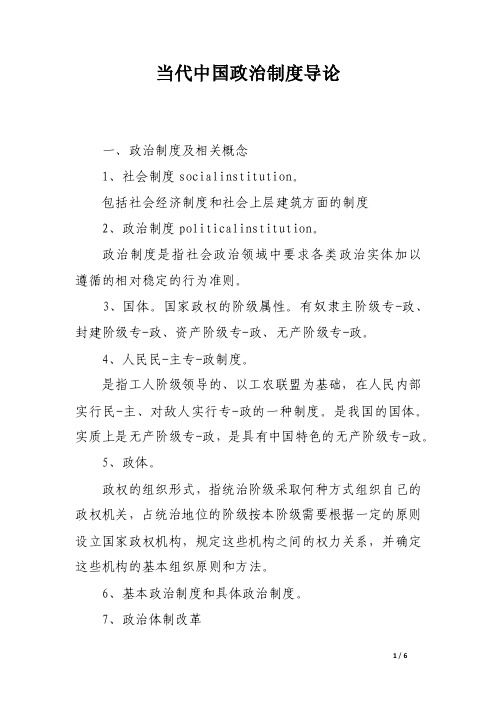
当代中国政治制度导论一、政治制度及相关概念1、社会制度socialinstitution。
包括社会经济制度和社会上层建筑方面的制度2、政治制度politicalinstitution。
政治制度是指社会政治领域中要求各类政治实体加以遵循的相对稳定的行为准则。
3、国体。
国家政权的阶级属性。
有奴隶主阶级专-政、封建阶级专-政、资产阶级专-政、无产阶级专-政。
4、人民民-主专-政制度。
是指工人阶级领导的、以工农联盟为基础,在人民内部实行民-主、对敌人实行专-政的一种制度。
是我国的国体。
实质上是无产阶级专-政,是具有中国特色的无产阶级专-政。
5、政体。
政权的组织形式,指统治阶级采取何种方式组织自己的政权机关,占统治地位的阶级按本阶级需要根据一定的原则设立国家政权机构,规定这些机构之间的权力关系,并确定这些机构的基本组织原则和方法。
6、基本政治制度和具体政治制度。
7、政治体制改革二、政治制度的相关原理1、主权国家理论TheSovereignState马克思主义国家观State:includesasetofpoliticalinstitutions-legislatu res,executives,bureaucracies,andarmies–aswellasthosewhorule-leadersandpowerfulgroups-which makeauthoritativeandbindingdecisionsoverthepeoplein aspecificgeographicarea.Nation:ethnicgroupcountry:geographicareaRegime:thesetofleadersandinstitutionsholdingpowerin astate.Sovereign:非政府组织NGo:non-governmentalorganizationEUwToImF2、合法性理论Legitimacywherepeoplefreelyacceptthosewhowieldpoweroverthem,p owerislegitimate.maxweber:Tradition,charisma,andRationality/LegalityLegitimacyisakeyfactorinunderstandingthesurvivalofr egimes.权力与权威PowerandAuthorityPowerreferstotheabilitytogetsomeonetodosomethingtha ttheywouldnototherwisedo.AuthorityIusuallyemployedtodenotepowerthatisvieweda sproperandisvoluntarilyacceptedbythosewhoaregoverned.3、民-主理论DemocracySelf-governmentascitizensdirectlyorindirectlygovern themselvesThreeelements:freeelections,respectforhumanrights,a ndlimitedgovernment自由选举Freeelection Electionmustbeheldonaregularbasisforthekeypolicy-ma-ki-ngpositioninnationalpoliticsElectionmustinvolvealternativecandidatesrepresentin gdifferentpoliticalviewpointsVotingshouldbeuniversalforalladults,andballotingsho uldbethroughsecretballotwiththeelectorateabletomake theirchoiceswithoutfearofsanctions.Electionresultsmustbehonestlytabulatedandthoseelect edbroughtintotheappropriateoffices人权与公民自由HumanrightsandcivillibertiesFreespeech;righttoassemble;freedomofthepress;freedo mofreligion;freedomfromdiscriminationonthegroundsof race,se-x,religion,orsocialclass;righttoaspeedyandf airtrialwhenaccusedofcrimes;righttovoteRighttojob,retirement,security,andmedicalcareTheserightsevolveovertimeandchangefromoneculturetoa nother.有限政府LimitedgovernmentSharingthedecisionma-ki-ngSharingtheriskofabsolutism三、当代中国政治制度的研究对象及主要内容当代中国政治制度,是指1949年10月以来的中华人民共和国的政治制度。
二十世纪的中国政治制度史研究
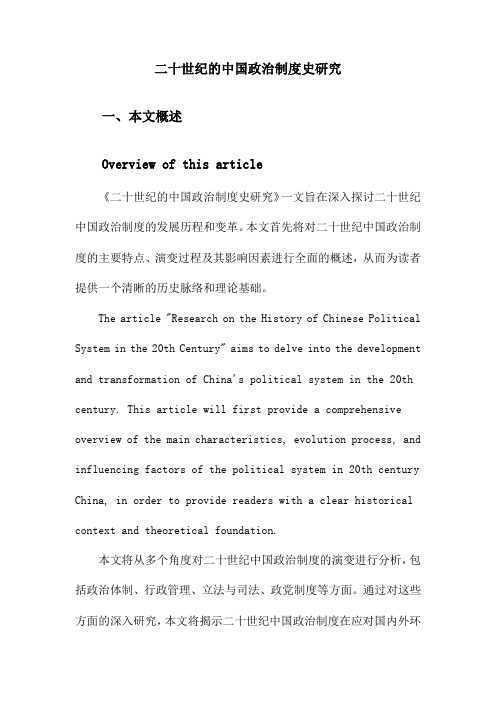
二十世纪的中国政治制度史研究一、本文概述Overview of this article《二十世纪的中国政治制度史研究》一文旨在深入探讨二十世纪中国政治制度的发展历程和变革。
本文首先将对二十世纪中国政治制度的主要特点、演变过程及其影响因素进行全面的概述,从而为读者提供一个清晰的历史脉络和理论基础。
The article "Research on the History of Chinese Political System in the 20th Century" aims to delve into the development and transformation of China's political system in the 20th century. This article will first provide a comprehensive overview of the main characteristics, evolution process, and influencing factors of the political system in 20th century China, in order to provide readers with a clear historical context and theoretical foundation.本文将从多个角度对二十世纪中国政治制度的演变进行分析,包括政治体制、行政管理、立法与司法、政党制度等方面。
通过对这些方面的深入研究,本文将揭示二十世纪中国政治制度在应对国内外环境变化、推动社会进步和满足人民需求方面的积极作用和局限性。
This article will analyze the evolution of China's political system in the 20th century from multiple perspectives, including political system, administrative management, legislation and justice, and party system. Through in-depth research on these aspects, this article will reveal the positive role and limitations of China's political system in responding to domestic and international environmental changes, promoting social progress, and meeting the needs of the people in the 20th century.在概述部分,本文将重点关注二十世纪中国政治制度的主要变革和转折点,如辛亥革命、五四运动、新中国成立等事件对中国政治制度产生的深远影响。
中美政治比较中英中英文对照
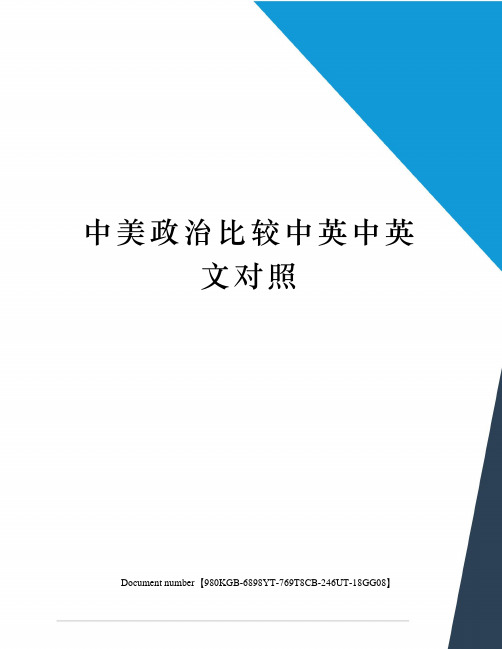
中美政治比较中英中英文对照Document number【980KGB-6898YT-769T8CB-246UT-18GG08】中美政治制度差异研究The political system of China and the United States differences research中国和美国政治制度现状China and the status quo of the American political system(一)中国的政治制度(a) of China's political system我国的政治制度概括起来主要有人民代表大会制度、中国人民政治协商制度、民族区域自治制度等。
In summary of political system in China mainly include the people's congress system, the Chinese people's political consultative system, regional national autonomy system, etc.中国宪法规定:“中华人民共和国实行的是人民代表大会制度,中华人民共和国的一切权力属于人民;人民行使国家权力的机关是全国人民代表大会和地方各级人民代表大会。
”全国人民代表大会是中国的最高国家权力机关,统一行使国家最高权力,人民代表大会制度是中国的根本政治制度,是实现人民民主专政的政治形式,是中国的政体。
全国人民代表大会和地方各级人民代表大会都由民主选举产生,对人民负责,受人民监督。
我国的选举制度是人民代表大会制度的重要组成部分,目前我国的选举制度的原则和主要内容一方面在宪法中得到确定,另一方面,全国人大组织法、地方各级人大组织法和选举法等有关法律法规也根据宪法所确立的社会主义选举制度的基本原则,对我国选举的具体内容作了详细的规定,它们同宪法一同构成了我国社会主义选举制度的法律基础。
中国政治英语词汇
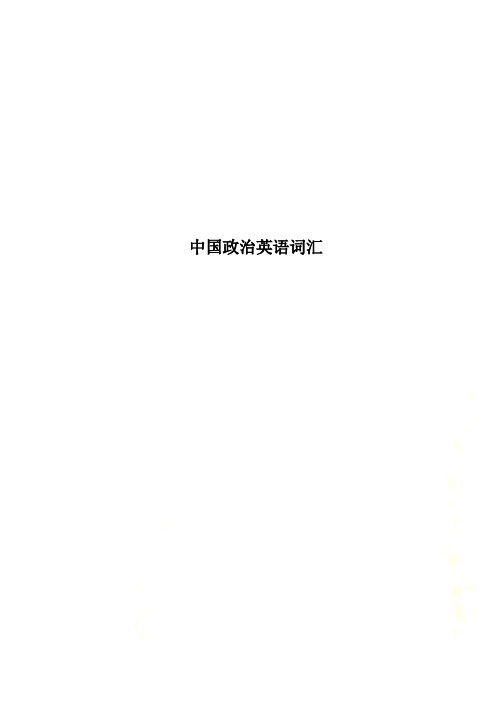
中国政治英语词汇(第一课)讀中文做口譯中国政体与国策I. 中国共产党中央委员会Central Committee of the Communist Party of China中国共产党中央委员会总书记General secretary of the Central Party Committee 中央政治局常务委员会Standing Committee of the Political Bureau of the CP中央书记处Secretariat of the Central Party Committee中央军事委员会Central Military Commission of the CPC (总后勤部 the General Logistics Department) (第二炮兵司令部the Headquarters of the 2nd Artillery Corps) (中国人民警察the Chinese People’s Armed Police Force) (国民自卫队 the Militia)中央纪律检查委员会Central Commission for Discipline Inspection of the CPC中央宣传部Publicity Department, CCCPC中央统一战线部United Front Work Department, CCCPC中央对外联络部International Liaison Department, CCCPC中央政法委员会Committee of Political and Legislative Affairs, CCCPC中央党校Party School of the CPC中央档案馆Archives Bureau, CCCPCII. 中国人民政治协商会议the Chinese People’s Political Consultative Conference 中国人民政治协商会议全国委员会the National Committee of the CPPCC中国人民政治协商委员会地方委员会CPPCC Local CommitteesIII. 中华人民共和国中央政府 the Central People’s Government of the PRC中华人民共和国主席 President of PRC中央政府和地方各级政府the Central government and local governments at different levels直辖市 Municipality 省会 Provincialand Commerce质检总局 General Administration of Quality Supervision, Inspection and Quarantine环保总局State Environmental Protection Administration民航总局General Administration of Civil Aviation广电总局State Administration of Radio, Film and Television安全监管总局 State Administration of Work Safety食品药品监管局State Food and Drug Administration国管局 Government Offices Administration of the State Council烟草局State Tobacco Monopoly Administration外专局State Administration of Foreign Experts Affair保密局National Administration for the Protection of State Secrets统计局 National Bureau of Statistics林业局 State Forestry Administration旅游局 National Tourism Administration知识产权局State Intellectual PropertyOffice地震局 China Earthquake Administration气象局 China Meteorological Administration信访局 State Bureau for Letters and Calls粮食局 State Administration of Grain海洋局 State Oceanic Administration测绘局 State Bureau of Surveying & Mapping档案局 State Archives Administration外汇局State Administration of Foreign Exchange新闻出版总署(版权局) General administration of Press and Publication(National Copyright Administration)4. 侨办 Overseas Chinese Affairs Office 国研室 Research Office港澳办 Hong Kong and Macao Affairs Office新闻办 Information Office法制办Legislative Affairs Office 台办 Taiwan Affairs Office社保基金会National Council for Social Security Fund自然科学基金会 National Natural Science Foundation(3) a. 最高人民法院 the Supreme People’sCourt(SPC)最高人民法院院长 the President of the SPC审判长 the presiding judge审判委员会 the Trial Committee 审判机关 the Trial Organ第一刑事法庭 the First Criminal Court 民事法庭 the Civil Courtb. 最高人民检察院 the Supreme People’s Procuratorate最高人民检察院检察长the Procurator-general of the SPP最高人民检察院副检察长the Deputy Procurator-general(4)香港特别行政区政府 Government of theHong Kong Special Administrative Region澳门特别行政区政府 Government of the Macao Special Administrative Region(5). 民主党派 Democratic Party中国国民党革命委员会(民革)Revolutionary Committee of the Kuomintang中国民主同盟(民盟)China Democratic League 中国民主建国会(民建)China Democratic National Construction Association中国民主促进会(民进)China Association Promoting Democracy中国农工民主党Chinese Peasants' and Workers' Democratic Party中国致公党China Zhi Gong Dang 九三学社Jiu San Society台湾民主自治同盟(台盟)Taiwan Democratic self-government二.口译政治用语和国策宪法 Constitution 国旗 National flag: Red flag with five stars国徽 National emblem: Tiananmen Gate-tower under five stars, encircled by ears of grain and with a gear wheel below国歌National anthem: March of the Volunteers 党章 Party Constitution1. 党的三代中央领导集体创建了毛泽东思想、邓小平理论、江泽民“三个代表”重要思想,从而在民族独立和人民解放的基础上为中华民族的伟大复兴开启了建设有中国特色的社会主义的伟大事业。
中外政治制度专业课程简介
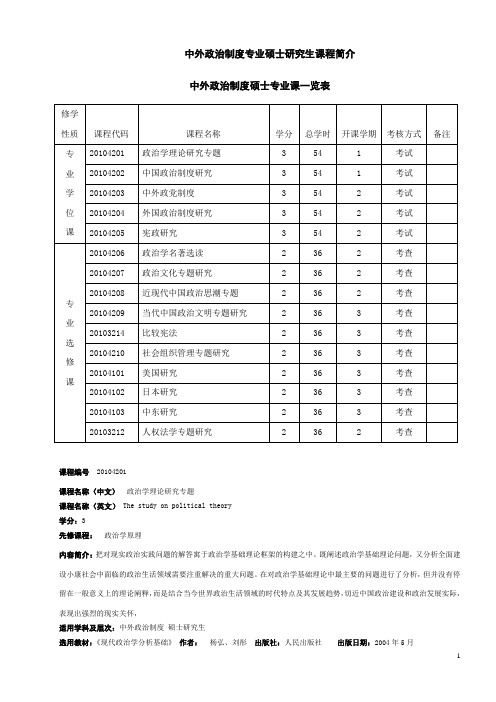
中外政治制度专业硕士研究生课程简介中外政治制度硕士专业课一览表课程编号 20104201课程名称(中文)政治学理论研究专题课程名称(英文) The study on political theory学分:3先修课程:政治学原理内容简介:把对现实政治实践问题的解答寓于政治学基础理论框架的构建之中。
既阐述政治学基础理论问题,又分析全面建设小康社会中面临的政治生活领域需要注重解决的重大问题。
在对政治学基础理论中最主要的问题进行了分析,但并没有停留在一般意义上的理论阐释,而是结合当今世界政治生活领域的时代特点及其发展趋势,切近中国政治建设和政治发展实际,表现出强烈的现实关怀,适用学科及层次:中外政治制度硕士研究生选用教材:《现代政治学分析基础》作者:杨弘、刘彤出版社:人民出版社出版日期:2004年5月课程编号20104202课程名称(中文)中国政治制度研究课程名称(英文) A Study on Chinese Political Systems学分:3先修课程:中国政治制度史当代中国政治制度内容简介:学习政治制度的基本理论和分析方法,梳理中国古代至近代政治制度发展的基本脉络,总结中国政治制度变迁的基本规律,分析各个时期政治制度的利弊得失及与当时社会发展的关系。
重点探究中国历史进程中一些有鲜明特点和重大影响的政治制度形态。
介绍国内外学术界研究中国政治制度的重要学术成果及学术观点,探讨中国政治制度研究中的难点和热点问题。
适用学科及层次:中外政治制度硕士研究生选用教材:自编讲义课程编号 20104203课程名称(中文)中外政党制度课程名称(英文)Political Party System of China and Foreign Countries学分:3先修课程:当代中国政治制度内容简介:政党制度是现代国家发展的重要条件和普遍的政治形式,政党和政党制度研究是现代政治学研究的重要内容。
本课程主要讲授中国近现代的政党制度和当代中国的政党制度;外国近现代的政党制度和当代西方资本主义的政党制度;比较中西政党制度的异同。
政治学基本理论和中国视角第三编第一章 政治制度和政策过程概论-精选文档
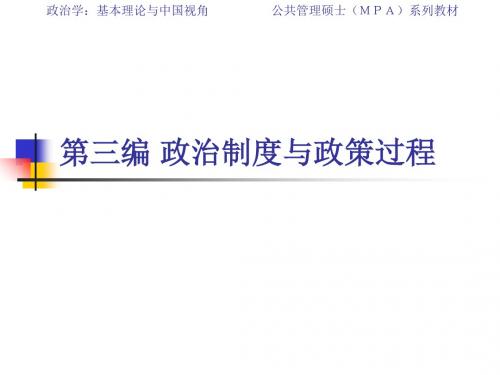
政治学:基本理论与中国视角
公共管理硕士(MPA)系列教材
1.1.政治制度及其基本类型
1.1.2.政治制度的主要类型 第三世界国家政治制度
3
第三世界国家政治制度则是二次世界大战后原先的殖民地、 半殖民地民族民主革命的产物。
“模仿性政治体制”的特征。 问题:不确定性和不稳定性。
政治学:基本理论与中国视角
1.1.政治制度及其基本类型
1.1.1.国家、宪法与政治制度
国家 “国家是建构政治制度的基本单位”。
国家权力体制或结构主要表现为横向和纵向两个方面: 国家政权组织形式和国家结构。 宪法与政治制度的高度契合则有宪政
政治学:基本理论与中国视角
公共管理硕士(MPA)系列教材
1.1.政治制度及其基本类型
公共管理硕士(MPA)系列教材
1.1.政治制度及其基本类型
1.1.2.政治制度的主要类型 对于该三分法的评价: 很强的意识形态和冷战色彩很强的理论功底和现 实意义。
在冷战结束后的现实意义已经大为降低: 首先,关于资本主义与社会主义的阵营划分已不 复存在; 其次,这一划分也没有涵括全球化和区域一体化 时代的超国家政治实体的政治制度。
在将权利让渡给国家使用的“契约”订立中,人类必 须就他们要建立的政治共同体的结构和组织形式,以 及让渡出哪些权利而制定出一整套的规则。这套“建 造国家之公约”就是所谓的“根本法”,即宪法。
宪法在限制国家权力的同时,还必须足以对公民权利 给以实际的保障
政治学:基本理论与中国视角
公共管理硕士(MPA)系列教材
政治学:基本理论与中国视角
公共管理硕士(MPA)系列教材
1.1.政治制度及其基本类型
46中国政治制度史
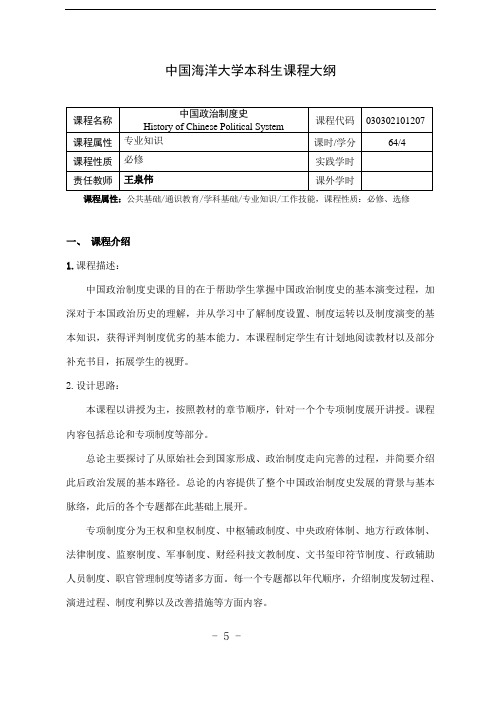
中国海洋大学本科生课程大纲课程属性:公共基础/通识教育/学科基础/专业知识/工作技能,课程性质:必修、选修一、课程介绍1.课程描述:中国政治制度史课的目的在于帮助学生掌握中国政治制度史的基本演变过程,加深对于本国政治历史的理解,并从学习中了解制度设置、制度运转以及制度演变的基本知识,获得评判制度优劣的基本能力。
本课程制定学生有计划地阅读教材以及部分补充书目,拓展学生的视野。
2.设计思路:本课程以讲授为主,按照教材的章节顺序,针对一个个专项制度展开讲授。
课程内容包括总论和专项制度等部分。
总论主要探讨了从原始社会到国家形成、政治制度走向完善的过程,并简要介绍此后政治发展的基本路径。
总论的内容提供了整个中国政治制度史发展的背景与基本脉络,此后的各个专题都在此基础上展开。
专项制度分为王权和皇权制度、中枢辅政制度、中央政府体制、地方行政体制、法律制度、监察制度、军事制度、财经科技文教制度、文书玺印符节制度、行政辅助人员制度、职官管理制度等诸多方面。
每一个专题都以年代顺序,介绍制度发轫过程、演进过程、制度利弊以及改善措施等方面内容。
- 5 -二、课程目标中国政治制度史作为行政管理低年级学生的一门专业知识必修课程,其教学目的在于拓展学生的知识面,强化专业基础。
到课程结束时,学生应能:(1)了解中国政治发展的基本脉络,了解各种主要的政治制度在中国历史中的发展历程以及其中的利弊得失。
历史中形成的制度文化拥有长久的影响力,行政管理的学生应该对此拥有基本的知识储备。
(2)对于政治制度拥有基本的理解能力,了解制度得以正常有效运转的一些条件,并能够基本拥有判断制度优劣的能力。
纸面上的制度与实际运转的制度存在着巨大差异,通过对各项制度的深入分析,能够让学生对此有所了解。
(3)结合古代中国的政治制度实践,对当下中国的一些制度问题拥有更加深入的思考。
传统政治制度中有不少值得借鉴,也有很多值得反思的,这些经验都对思考当今的一些制度问题有所助益。
中国政治制度介绍英文

中国政治制度介绍英文Introduction to China's Political SystemChina, officially known as the People's Republic of China, is a country with a unique political system that has evolved over thousands of years. The political structure in China is based on the principle of socialism with Chinese characteristics, and it has its own distinct features that differentiate it from other political systems in the world. In this article, we will provide an overview of the political system in China.1. The Communist Party of China (CPC):The Communist Party of China is the ruling political party in China. It was founded in 1921 and has been in power since 1949. The CPC is governed by a Central Committee, which consists of top leaders, and it exercises supreme authority in decision-making and policy formulation in China.2. The National People's Congress (NPC):The National People's Congress is the highest organ of state power in China. It is the legislative body and is responsible for making and amending laws. The NPC is composed of nearly 3,000 delegates who are elected from all provinces, autonomous regions, municipalities, and special administrative regions across China.3. The State Council:The State Council is the executive branch of the Chinese government. It is led by the Premier, who is appointed by the President of China. The State Council is responsible for implementing laws and policies, managing the economy, and overseeing various administrative departments.4. The President:The President of China is the head of state and represents the country both domestically and internationally. The President serves as the ceremonial and symbolic leader of China and is elected by the National People's Congress for a term of five years.5. The Chinese People's Political Consultative Conference (CPPCC):The CPPCC is an advisory body that operates alongside the government. It consists of representatives from various political parties, social organizations, and ethnic minority groups. The CPPCC provides suggestions and proposals on major political and social issues, contributing to the decision-making process.6. The Judiciary System:The legal system in China is based on civil law with Chinese characteristics. The Supreme People's Court is the highest judicialauthority and is responsible for interpreting laws and ensuring their fair implementation. It is supported by lower-level courts and specialized courts for specific areas such as intellectual property and maritime affairs.7. Local Government Structure:China is divided into 23 provinces, 5 autonomous regions, 4 municipalities directly under the central government, and 2 special administrative regions. Each province, autonomous region, and municipality has its own local government structure, which is responsible for implementing policies and managing local affairs.It is important to note that the political system in China is characterized by a strong emphasis on collective leadership and consensus-based decision-making. The CPC plays a central role in guiding and leading the country, and its leadership is based on a combination of meritocracy and organizational discipline.In conclusion, China's political system is a unique and complex entity that has evolved over time. With the CPC at the helm, the system combines socialist principles with Chinese characteristics to govern the country. The National People's Congress and the State Council are key components of the system, ensuring that laws are made and implemented effectively. The CCPCC provides additional perspectives and advice, while the judicial system upholds the rule of law. With its distinctivefeatures and structures, China's political system continues to shape the country's development in the 21st century.。
【2016两会中英双语介绍】 中国的立法体制和法律体系(节选)
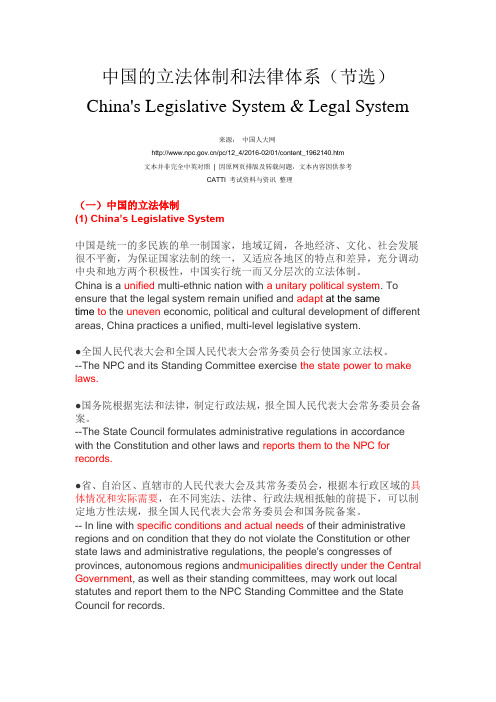
中国的立法体制和法律体系(节选)China's Legislative System & Legal System来源:中国人大网/pc/12_4/2016-02/01/content_1962140.htm文本并非完全中英对照| 因原网页排版及转载问题,文本内容因供参考CATTI 考试资料与资讯整理(一)中国的立法体制(1) China’s Legislative System中国是统一的多民族的单一制国家,地域辽阔,各地经济、文化、社会发展很不平衡,为保证国家法制的统一,又适应各地区的特点和差异,充分调动中央和地方两个积极性,中国实行统一而又分层次的立法体制。
China is a unified multi-ethnic nation with a unitary political system. To ensure that the legal system remain unified and adapt at the sametime to the uneven economic, political and cultural development of different areas, China practices a unified, multi-level legislative system.●全国人民代表大会和全国人民代表大会常务委员会行使国家立法权。
--The NPC and its Standing Committee exercise the state power to make laws.●国务院根据宪法和法律,制定行政法规,报全国人民代表大会常务委员会备案。
--The State Council formulates administrative regulations in accordance with the Constitution and other laws and reports them to the NPC for records.●省、自治区、直辖市的人民代表大会及其常务委员会,根据本行政区域的具体情况和实际需要,在不同宪法、法律、行政法规相抵触的前提下,可以制定地方性法规,报全国人民代表大会常务委员会和国务院备案。
中国特色社会主义法治体系白皮书中英文对照版本
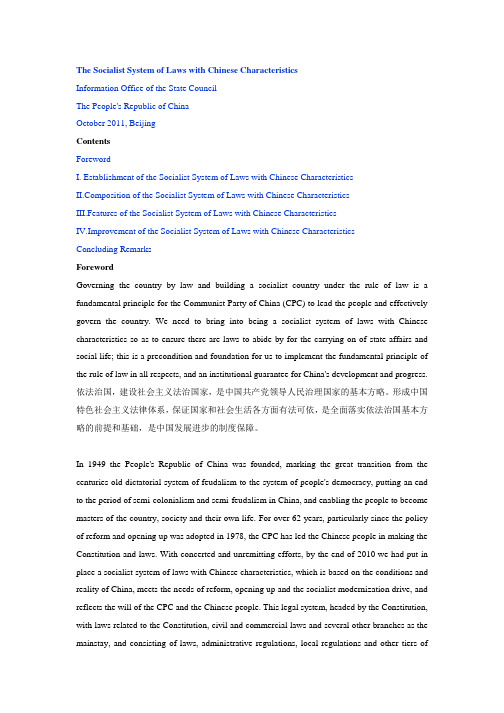
The Socialist System of Laws with Chinese CharacteristicsInformation Office of the State CouncilThe People's Republic of ChinaOctober 2011, BeijingContentsForewordI. Establishment of the Socialist System of Laws with Chinese Characteristicsposition of the Socialist System of Laws with Chinese CharacteristicsIII.Features of the Socialist System of Laws with Chinese CharacteristicsIV.Improvement of the Socialist System of Laws with Chinese CharacteristicsConcluding RemarksForewordGoverning the country by law and building a socialist country under the rule of law is a fundamental principle for the Communist Party of China (CPC) to lead the people and effectively govern the country. We need to bring into being a socialist system of laws with Chinese characteristics so as to ensure there are laws to abide by for the carrying on of state affairs and social life; this is a precondition and foundation for us to implement the fundamental principle of the rule of law in all respects, and an institutional guarantee for China's development and progress. 依法治国,建设社会主义法治国家,是中国共产党领导人民治理国家的基本方略。
- 1、下载文档前请自行甄别文档内容的完整性,平台不提供额外的编辑、内容补充、找答案等附加服务。
- 2、"仅部分预览"的文档,不可在线预览部分如存在完整性等问题,可反馈申请退款(可完整预览的文档不适用该条件!)。
- 3、如文档侵犯您的权益,请联系客服反馈,我们会尽快为您处理(人工客服工作时间:9:00-18:30)。
State Council
国务院隶属部门
Departments of the State Council
Ministry of Foreign Affairs 外交部 Ministry of National Defense 国防部 National Development and Reform Commission 国家发展和改革委员会 Ministry of Education 教育部 Ministry of Science and Technology 科学技术部 State Ethnic Affairs Commission 国家民族事务委员会 Ministry of Environment Protection 环保部 Ministry of Industry and InformationConstruction Technology 住房与城乡建设部 工业和信息化部 Ministry of Housing and Urban-Rural Ministry of Public Security 交通运输部 公安部 Ministry of Transportation Ministry of StateResources Security 国家安全部 Ministry of Water 水利部 Ministry of Supervision 监察部 Ministry of Culture 文化部 Ministry of Civil Affairs 农业部 民政部 Ministry of Agriculture Ministry of Justice 司法部 Ministry of Commerce 商务部 Ministry of Finance 财政部 Health and Family Planning Commission 国家卫生和计划生育委员会 Ministry Bank of Land and Resources 国土资源部 People's of China 中国人民银行 Ministry of Human Resources Audit Commission 审计署 and Social Security 人社部
中国梦 China Dream
பைடு நூலகம்
President of the People's Republic of China Standing Committee Central Military Commission Supreme People's Court Supreme People's Procuratorate
中央军事委员会 最高人民法院 最高人民检察院 国务院
中华人民共和国是工人阶级领导的,以工 农联盟为基础的人民民主专政的社会主义国家。 社会主义制度是中华人民共和国根本制度。
中国国家机关
China's State Organs
The System of Nation
全国人民代表大会 国家主席 常务委员会
National People's Congress (NPC)
中国共产党
the Communist Party of China(CPC)
The Communist Party of China is the vanguard of the Chinese working class and the faithful representative of the interests of the Chinese people of all ethnic groups. It is the core of the leadership over the socialist republic of China . It works towards the highest form of advanced productivity ,advanced culture ,and the basic interests of the Chinese people.
the theoretical system of socialism
中国社会主义思想
毛泽东思想 Mao Zedong Thought
邓小平理论 Deng Xiaoping Theory
“三个代表” Three Represents
科学发展观 the Scientific Development Concept
China Democratic League 中国民盟 Jiu San(September 3) Society 九三学社 China Public Interest Party 中国致公党 Revolutionary Committee of the Chinese Kuomintang 中国国民党革命委员会 China Association for promoting Democracy 中国民主促进会 Chinese Peasants and Workers Democratic Party 中国农工民主党 … …
Political Systems
Political Systems in China
China's State Organs The Communist Party of China(CPC) The theoretical system of socialism社会主义的 理论体系
The People’s Republic of China is a socialist country led by the working class , based on the worker-peasant alliance and practicing people’s democratic centralism . The socialist system is the primary system in China.
People‘s Political Consultative Conference 政治协商会议
Multi-Party Cooperation 多党合作 “long-term coexistence ,mutual supervision , sincere treatment with each other and sharing of weal or woe” “长期共存,互相监督,肝胆相照,荣辱与共” Democratic Parties
中国共产党是中国工人阶级的先锋队,同时 也是中国人民和中华民族的先锋队,是中国特色 社会主义事业的领导核心,代表中国先进生产力 的发展要求,代表中国先进文化的前进方向,代 表中国最广大人民的根本利益。
The System of CPC
The CPC’s National Congress 中国共产党全国人民代表大会 The Central Committee 中央委员会 (CCCPC) The Central Commission for Discipline Inspection 中央纪律检查委员 CCCPC general secretary中央委员会总书记 The Central Political Bureau 中央政治局 The Political Bureau’s Standing Committee 中央政治局常委员会 The Central Secretariat 中央书记处 The Central Military Commission 中央军事委员会
